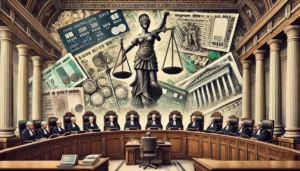Facts of the Case:
The case concerns the constitutional interpretation of legislative competence over “intoxicating liquor” under Entry 8 of List II (State List) of the Seventh Schedule of the Indian Constitution. The issue arose regarding whether the term “intoxicating liquor” includes only potable alcohol or also extends to industrial alcohol. The appellants, the State of U.P., contested the interpretation in earlier judgments that restricted the State’s authority over industrial alcohol. The reference was made to a larger bench to reconsider the scope of Synthetics & Chemicals Ltd. v. State of U.P. (1990) concerning legislative competence and taxation of alcohol used in industries.
Contentions of the Appellants (State of U.P.):
- Entry 8 of List II, which governs intoxicating liquors, includes industrial alcohol based on historical legislative understanding.
- The framers of the Constitution used distinct terminology across entries to differentiate taxation and regulation, implying that “intoxicating liquors” should encompass all alcohols.
- Legislative fields under Entry 8 of List II should not be restricted by Parliamentary legislation such as the Industries (Development and Regulation) Act (IDRA).
- States have the competence to regulate alcohol production, distribution, and taxation, as denatured spirit production and denaturation occur within State supervision.
- The absence of a notified order under Section 18G of IDRA implies no complete occupation of the legislative field by the Union.
Contentions of the Respondent (Union of India):
- Industrial alcohol falls outside the scope of “intoxicating liquors” in Entry 8 of List II, as it is not meant for human consumption.
- Entry 52 of List I and Entry 33 of List III allow Parliament to legislate comprehensively on industries declared to be in public interest, including the alcohol industry.
- IDRA provides a framework for the Union to regulate industrial alcohol uniformly, avoiding misuse and ensuring equitable distribution.
- Historical understanding and Constituent Assembly debates support Union control over industrial alcohol production and trade.
Issues:
- Whether the term “intoxicating liquors” in Entry 8 of List II includes industrial alcohol.
- Whether States retain legislative competence to regulate industrial alcohol under Entry 8 of List II or if this field is occupied by IDRA under Entry 52 of List I.
- Whether the absence of a notified order under Section 18G of IDRA allows States to legislate on matters related to Entry 33 of List III.
- Whether the decision in Synthetics & Chemicals Ltd. (1990) correctly delineated the legislative powers concerning industrial alcohol.
Observations/Findings by the Supreme Court:
- The Court reaffirmed that “intoxicating liquors” refer to potable alcohol meant for human consumption, not industrial alcohol.
- Industrial alcohol falls under Entry 52 of List I and Entry 33 of List III, placing it within Parliament’s domain.
- States retain the power to regulate potable alcohol for public health and levy taxes on it but not on industrial alcohol.
- Section 18G of IDRA effectively occupies the field, even without a notified order, precluding State legislation on industrial alcohol.
Principle of the Case:
The judgment clarifies the constitutional framework for the distribution of legislative powers over alcohol, emphasizing Parliament’s exclusive control over industrial alcohol under IDRA and limiting States’ authority to potable alcohol regulation.
Final Order:
The Court upheld the interpretation in Synthetics & Chemicals Ltd., restricting States’ legislative competence over industrial alcohol while allowing them to regulate potable alcohol for human consumption.
Impact on Public Law and Order:
This judgment reinforces uniform regulation of industrial alcohol across India, ensuring it is not diverted for human consumption as illicit liquor. By clarifying legislative roles, it strengthens public health safeguards and prevents revenue loss to States due to unauthorized alcohol distribution.
Case Citation:
Supreme Court of India, State of U.P. & Ors. vs. M/S Lalta Prasad Vaish and Sons, Civil Appeal No. 151 of 2007, Judgment Date: 2024-10-23.








